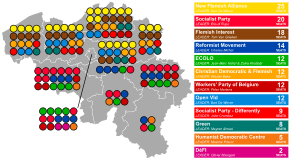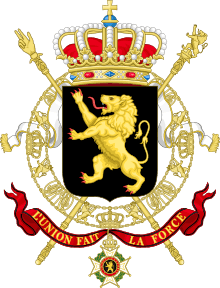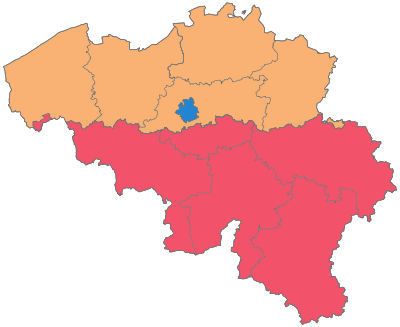2019 Belgian federal election
Federal elections were held in Belgium on 26 May 2019, alongside the country's European and regional elections. All 150 members of the Chamber of Representatives were elected from eleven multi-member constituencies.
| ||||||||||||||||||||||||||||||||||||||||||||||||||||||||||||||||||
All 150 seats in the Chamber of Representatives 76 seats needed for a majority | ||||||||||||||||||||||||||||||||||||||||||||||||||||||||||||||||||
|---|---|---|---|---|---|---|---|---|---|---|---|---|---|---|---|---|---|---|---|---|---|---|---|---|---|---|---|---|---|---|---|---|---|---|---|---|---|---|---|---|---|---|---|---|---|---|---|---|---|---|---|---|---|---|---|---|---|---|---|---|---|---|---|---|---|---|
| Turnout | 90,01% | |||||||||||||||||||||||||||||||||||||||||||||||||||||||||||||||||
This lists parties that won seats. See the complete results below. | ||||||||||||||||||||||||||||||||||||||||||||||||||||||||||||||||||
 Results of the election in all 11 constituencies. | ||||||||||||||||||||||||||||||||||||||||||||||||||||||||||||||||||
| ||||||||||||||||||||||||||||||||||||||||||||||||||||||||||||||||||
 |
|---|
| This article is part of a series on the politics and government of Belgium |
|
|
|
|
Federal Cabinet |
|
|
The far-right Vlaams Belang (VB) saw a resurgence in Flanders, and with the New Flemish Alliance (NVA), parties subscribing to Flemish separatism and nationalism obtained nearly 50% of the vote in Flanders.
In addition, gains for the far-left Workers' Party of Belgium (PVDA-PTB), and the green Ecolo party in Wallonia occurred. Overall though, traditional parties suffered losses in both regions.
Background
Following the 2014 elections, a centre-right government consisting of N-VA, CD&V, Open Vld and MR was formed, led by Prime Minister Charles Michel (MR). The government coalition is unique in several aspects: the N-VA participates for the first time, the MR is the only French-speaking party, and the French-speaking Socialist Party is not part of the government for the first time in 25 years.
Local elections were held on 14 October 2018. As such, the 2019 simultaneous regional, federal and European elections were held only several months after the local elections.
In early December 2018, a political crisis emerged regarding the Global Compact for Migration, which was supposed to be signed but sparked instead opposition from government party N-VA. As the three other government parties as well as a large majority in parliament supported the compact, N-VA left the government and the three other parties continued briefly as a minority cabinet (Michel II) with an unclear status. Prime Minister Michel ultimately offered his resignation to the King on 18 December 2018, who accepted it three days later. As regular elections were scheduled for May 2019 anyway, snap elections were only favoured by N-VA and Vlaams Belang and did not happen, and the minority cabinet continued as a caretaker government until the elections.[1]
Electoral system
The 150 members of the Chamber of Representatives were elected in 11 multi-member constituencies, being the ten provinces and Brussels, with between 4 and 24 seats. Seats are allocated using the D'Hondt method, with an electoral threshold of 5% per constituency.[2]
Representatives elected from the five Flemish provinces, Antwerp (24), East Flanders (20), Flemish Brabant (15), Limburg (12) and West Flanders (16), automatically belonged to the Dutch-speaking language group in parliament, whereas those elected from the five Walloon provinces, Hainaut (18), Liège (15), Luxembourg (4), Namur (6) and Walloon Brabant (5), formed the French-speaking language group. The 15 members elected in Brussels could choose to join either group, though de facto only French-speaking parties reach the threshold. Apportionment of seats is done every ten years in accordance with population data, last by royal order of 31 January 2013.[3]
The 60-member Senate is composed of 50 representatives from the regional and community parliaments, plus 10 co-opted senators proportionally divided among parties based on the result of the federal election.
All Belgian citizens aged 18 or over were obligated to participate in the election. Non-Belgian citizens residing in Belgium (regardless of EU citizenship) couldn't vote, whereas Belgian citizens living abroad could register to vote.
Date
The 2011–14 state reform changed several aspects regarding federal elections. Starting with the May 2014 election, which coincided with European Parliament and regional elections, the federal parliament is elected for a five-year term rather than a four-year term.
The federal elections would from then on always coincide with the European Parliament elections;[4] snap federal elections would trigger a parliamentary term lasting until the next European Parliament elections.[5] However, as of 2017, a law needed for this to take effect has not been enacted. Given the five-year term for all three elections, they all coincided in 2019 regardless, as no snap federal elections were called.
Additionally, de facto practice is to formally dissolve parliament and trigger new elections by Declaration of Revision of the Constitution shortly before regular expiry of the parliamentary term.
Parties and leaders
Main candidates
The following candidates are the first on the respective party list (lijsttrekker / tête de liste) per constituency.
Dutch-speaking constituencies
| Party | |||||||
|---|---|---|---|---|---|---|---|
| CD&V | Servais Verherstraeten | Pieter De Crem | Koen Geens | Wouter Beke | Hendrik Bogaert | Sabine de Bethune | |
| Groen | Kristof Calvo | Stefaan Van Hecke | Jessika Soors | Barbara Creemers | Wouter De Vriendt | N/A | |
| N-VA | Jan Jambon | Anneleen Van Bossuyt | Theo Francken | Zuhal Demir | Sander Loones | Elias Kartout | |
| Open Vld | Christian Leysen | Alexander De Croo | Maggie De Block | Patrick Dewael | Vincent Van Quickenborne | Mimi Crahaij | |
| PVDA | Peter Mertens | Steven De Vuyst | Bea Knaepen | Ayse Yigit | Ilona Vandenberghe | ||
| sp.a | Yasmine Kherbache | Joris Vandenbroucke | Karin Jiroflée | Meryame Kitir | John Crombez | ||
| Vlaams Belang | Tom Van Grieken | Barbara Pas | Dries Van Langenhove | Annick Ponthier | Wouter Vermeersch | ||
French-speaking constituencies
| Party | |||||||
|---|---|---|---|---|---|---|---|
| cdH | Catherine Fonck | Vanessa Matz | René Collin | Maxime Prévot | Olivier Vanham | Joëlle Milquet | |
| DéFI | Alexandra Dupire | Pierre-Yves Dupuis | François De Smet | ||||
| Ecolo | Jean-Marc Nollet | Sarah Schlitz | Georges Gilkinet | Simon Moutquin | Zakia Khattabi | ||
| MR | Charles Michel | Didier Reynders | |||||
| PP | |||||||
| PS | Elio Di Rupo | Frédéric Daerden | André Flahaut | Ahmed Laaouej | |||
| PTB | Marco Van Hees | Raoul Hedebouw | Thierry Warmoes | Maria Vindevoghel | |||
Campaign
Despite leaving the government coalition in late 2018, it was the explicit ambition of N-VA to continue governing after the May 2019 election. In January 2019, the party put forward ex-minister Jan Jambon as candidate for Prime Minister should the party enter a coalition.[6] A continuation of the "Swedish coalition" (N-VA, MR, CD&V and Open Vld), potentially expanded with cdH, was a likely scenario. Outgoing Prime Minister Charles Michel (MR) is candidate to continue in his position.[7]
Meanwhile, the French-speaking Socialist Party (PS) had the ambition to re-enter government as well, or "re-conquer" as formulated by leader Elio Di Rupo, after being in the opposition at federal level and being ousted from the Walloon government.[8]
Additionally, there was speculation that the Flemish liberal and green parties (Open Vld and Groen) would favour cooperating, given Groen's recent rise and their local governing coalitions in cities like Mechelen, Gent and Oostende. However, their French-speaking counterparts, MR and Ecolo, are politically and ideologically further apart.[9][10]
Retiring incumbents
The following incumbent members of the Chamber of Representatives announced their retirement from (national) politics:
- Hans Bonte (sp.a, Flemish Brabant)[11]
- Peter Dedecker (N-VA, East Flanders)[12]
- Alain Mathot (PS, Liège)[13]
- Laurette Onkelinx (PS, Brussels)[14]
- Goedele Uyttersprot (N-VA, East Flanders)[15]
- Dirk Van der Maelen (sp.a, East Flanders)[16]
- Eric Van Rompuy (CD&V, Flemish Brabant)[17]
- Peter Vanvelthoven (sp.a, Limburg)[18]
- Jan Vercammen (N-VA, West Flanders)[19]
Opinion polls
Results
 | ||||
|---|---|---|---|---|
| Party | Votes | % | Seats | +/– |
| New Flemish Alliance | 1,086,787 | 16.03 | 25 | –8 |
| Vlaams Belang | 810,177 | 11.95 | 18 | +15 |
| Parti Socialiste | 641,623 | 9.46 | 20 | –3 |
| Christen-Democratisch en Vlaams | 602,520 | 8.89 | 12 | –6 |
| Workers' Party of Belgium | 584,621 | 8.62 | 12 | +10 |
| Open Vlaamse Liberalen en Democraten | 579,334 | 8.54 | 12 | –2 |
| Mouvement Réformateur | 512,825 | 7.56 | 14 | –6 |
| Socialistische Partij Anders | 455,034 | 6.71 | 9 | –4 |
| Ecolo | 416,452 | 6.14 | 13 | +7 |
| Groen | 413,836 | 6.10 | 8 | +2 |
| Centre démocrate humaniste | 250,861 | 3.70 | 5 | –4 |
| DéFI | 150,394 | 2.22 | 2 | 0 |
| People's Party | 75,096 | 1.11 | 0 | –1 |
| DierAnimal | 47,733 | 0.70 | 0 | New |
| Listes Destexhe | 42,712 | 0.63 | 0 | New |
| Collectif Citoyen | 21,092 | 0.31 | 0 | New |
| La Droite | 15,075 | 0.22 | 0 | 0 |
| Nation | 10,583 | 0.16 | 0 | 0 |
| Les Belges d'Abord | 10,463 | 0.15 | 0 | New |
| Agir | 7,598 | 0.11 | 0 | New |
| Pirate Party | 7,521 | 0.11 | 0 | 0 |
| D-SA | 5,949 | 0.09 | 0 | New |
| Lutte Ouvrière | 5,735 | 0.08 | 0 | 0 |
| PRO | 5,682 | 0.08 | 0 | New |
| Wallonie Insoumise | 5,354 | 0.08 | 0 | New |
| BUB Belgische Unie | 4,513 | 0.07 | 0 | New |
| PV&S | 3,217 | 0.05 | 0 | New |
| B.U.B | 2,098 | 0.03 | 0 | New |
| de coöperatie | 1,732 | 0,03 | 0 | New |
| Volt | 1,669 | 0.02 | 0 | New |
| Communist Party of Belgium | 1,626 | 0.02 | 0 | New |
| Turquoise | 626 | 0.01 | 0 | New |
| Invalid/blank votes | 438,095 | – | – | – |
| Total | 7,218,633 | 100 | 150 | |
| Registered voters/turnout | 8,167,709 | 88.38 | – | – |
| Source: IBZ | ||||
Aftermath
The election once again exposed the deep linguistic, ethnic and regional divisions of Belgium, with the Dutch-speaking region of Flanders strongly voting for right-wing Flemish nationalist and separatist parties, and the French-speaking region of Wallonia strongly voting left.[20][21]
In response to Vlaams Belang's surge in support there has been some speculation that the N-VA leader Bart De Wever may break the Cordon sanitaire imposed on the party, resulting in the two Flemish nationalist parties joining forces, by refusing to rule out talks with the VB, as their strong results could make forming a coalition more difficult.[22][23]
The People's Party, a small right-wing French-speaking party, dissolved on 18 June through an internal party vote in response to losing their only seat in the elections. Former party leader Mischaël Modrikamen blamed the "systematic exclusion of the People's Party from the political and media debate."[24]
In the days following the election, King Philippe held consultations with all main party leaders, including Vlaams Belang party leader Tom Van Grieken. According to British newspaper The Guardian, 1936 was the last time a far-right leader had an official meeting with the king.[25]
On 30 May, King Philippe appointed Johan Vande Lanotte (sp.a) and Didier Reynders (MR), two experienced politicians with a long period of service, as informateurs. They reported on their progress by 6 June as expected,[26] after which they were given some more time, with a new deadline of 17 June.[27] After this deadline passed, another extension was granted until 1 July,[28] and again until 29 July[29] and one more extension until 9 September.[30]
On 24 August the Belgian government decided to appoint Didier Reynders as European Commissioner.[31] On 4 October 2019, King Philippe announced the end of the first phase of federal government formation talks, with the informateurs advising that a government of the N-VA, the Socialist Party and the Greens was the best option to pursue. The informateurs will report back to the king of the 4 November, following which a formateur will be appointed to introduce the third stage of government formation.[32]
On 4 November, the two new informateurs, Rudy Demotte and Geert Bourgeois, offered their resignations to the King, as they could not break the political deadlock.[33]
On March 17, 2020, the Wilmès II Government government had its mandate extended, with external support from most parliamentary parties, in order to manage the coronavirus pandemic. Informal talks on forming a new government began in June of 2020.[34]
References
- "Belgian PM to stay on heading caretaker government". Reuters. 21 December 2018. Retrieved 28 June 2019.
- Electoral system IPU
- "Moniteur Belge - Belgisch Staatsblad". www.ejustice.just.fgov.be. Retrieved 28 June 2019.
- Article 65 of the Belgian Constitution
- Article 46 of the Belgian Constitution
- "De Wever is kandidaat om Vlaams minister-president te worden, Jambon kandidaat-premier, Bourgeois gaat Europees". VRTNWS. 14 January 2019.
- ""Charles Michel est le candidat Premier ministre du MR"". 7sur7. 17 April 2019.
- "Di Rupo (PS): "Het is tijd voor de herovering. We zijn het enige geloofwaardige linkse alternatief"". Het Laatste Nieuws. 11 January 2019.
- "'Blauw en groen kunnen elkaar vinden in 2019'". De Standaard. 8 December 2018.
- "De blauw-groene motor loopt in Vlaanderen misschien warm, maar in Franstalig België helemaal niet". VRTNWS. 11 January 2019.
- "Hans Bonte stopt met nationale politiek". De Morgen. 23 April 2018.
- "Peter Dedecker (N-VA) stopt in 2019 met actieve politiek". De Standaard. 11 December 2017.
- "Alain Mathot annonce renoncer à se présenter aux prochains scrutins". Le Vif. 30 June 2018.
- "Onkelinx stopt met actieve politiek in 2019". De Standaard. 13 September 2017.
- "Goedele Uyttersprot (N-VA) keert niet meer terug naar Kamer". De Standaard. 21 January 2018.
- "SP.A'er Dirk Van der Maelen is geen kandidaat meer in 2019". deredactie.be. 5 July 2017.
- "Eric Van Rompuy stopt in 2019: 'Er is een tijd van komen en gaan'". De Standaard. 7 February 2017.
- "Peter Vanvelthoven (sp.a) stopt helemaal met politiek". Het Belang van Limburg. 15 January 2019.
- "N-VA-Kamerlid Jan Vercammen houdt ermee op". Focus WTV. 21 February 2018.
- Belgian king meets Flemish far right for first time since 1930s, amid fears of 'Vlexit' breakaway The Telegraph, 29 May 2019
- Election treble spells trouble for Belgium Politico, 27 May 2019
- "Belgium's 'Black Sunday' sees far-right surge, threatens new government crisis". Euractive. Retrieved 28 May 2019.
- "Belgium's far-right not ruled out of potential coalition". The Brussels Times. Retrieved 28 May 2019.
- "Modrikamen l'a annoncé: le PP, c'est terminé". La Libre. 19 June 2019.
- Belgian king's meeting with far-right leader sparks controversy The Guardian, 29 May 2019
- Koning Filip stelt Johan Vande Lanotte en Didier Reynders aan als informateur VRT, 30 May 2019
- Reynders en Vande Lanotte blijven informateur tot 17 juni: "Lange formatie van 2010 overdoen, is niet mogelijk" VRT, 6 June 2019
- Mission to form Belgian government extended by King Philippe Xinhua, 18 June 2019
- Informateurs Vande Lanotte en Reynders werken verder aan preformatienota VRT, 1 July 2019
- Vande Lanotte en Reynders nog tot 9 september informateur VTM, 29 July 2019
- Didier Reynders (MR) voorgedragen als Belgische Eurocommissaris: "Franstaligen waren eensgezind, Vlamingen niet" VRT, 24 August 2019
- Royal Central, 9 October 2019
- https://euobserver.com/political/146520
- https://crisisinbelgium.blogspot.com/2020/06/mission-impossible.html
